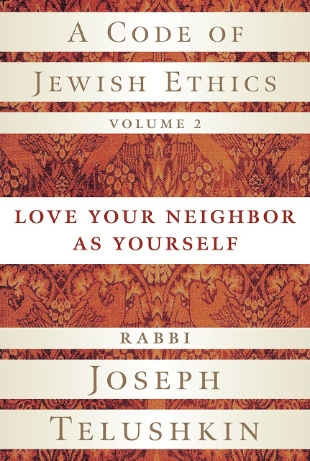Joseph Telushkin is a spiritual leader and author of 16 books including Jewish Literacy. He is a senior associate of CLAL (National Jewish Center for Learning and Leadership) and the rabbi of the Synagogue for the Performing Arts in Los Angeles. This is the follow-up volume to one of S&P's "Best Spiritual Books of 2006," A Code for Jewish Ethics, Volume 1: You Shall Be Holy, which covers Jewish laws, with commentary on ways to improve character and "become a more honest, decent, and just people."
Telushkin points out that Judaism has always been defined in ethical terms and that "loving our neighbor as ourselves" is the best-known commandment in the Bible and the linchpin of Judaism. Many Jewish ethical teachings and much profound wisdom stem from this commandment. Hillel presented a negative formulation of it: "What is hateful to you, do not do to your neighbor." He also said of loving our neighbor — "This is the whole Torah! All the rest is commentary."
This substantive and wide-ranging book, which contains quotations and practices from both ancient and modern resources, is arranged in the following five sections:
• Loving Your Neighbor
• Jews and Non-Jews
• The Animal World
• When Life Is at Stake
• Justice and Tolerance
The most practical and down-to-earth section is the first, where Telushkin covers Hospitality (Being a Good Host, The Duties of a Guest), Visiting the Sick (Providing More Than Just Company, Three Obligations, Etiquette for Visiting the Sick), Final Kindness (Obligations to the Dead), Comforting Mourners (Caring for the Bereaved), and The Laws of Kindness (Practicing Kindness, Giving Advice).
Here are some of the many ways in which we can practice love for our neighbors:
• "Acting lovingly and helpfully, therefore, should not depend on idealizing those whom we love, nor should we show them love only because we judge them to be saintly. After all, if other people withheld love from us because of our imperfections, we would never be loved. And just as we want others to love us despite our faults, so, too, should we love others.
• "The great kabbalist Rabbi Isaac Luria taught that each morning, before praying, we should resolve: 'Behold, I accept the positive command of the Creator to "Love your neighbor as yourself." ' "
• "Rejoice in your neighbor's joy. Jewish sources cite helping a bride and groom to rejoice as an example of how to fulfill this commandment."
• The Chaffetz Chayyim teaches that we fulfill the command to love our neighbor when we point out to someone that something he is doing will expose him to disapproval and ridicule."
• "Accompany your guests on their way. When the guests have concluded their visit, walk with them for a distance. By this gesture you make it clear that you enjoyed their company so much you wished to remain with them a little longer."
• "Rabbi Zalman Schachter-Shalomi suggested that the moment we hear a siren, signifying an ambulance, a fire truck, or a police car, we should stop whatever we are doing and pray that help would arrive in time."
• "Periodically count up the number of times you have lost your temper unfairly; then donate the designated amount to charity. Through this technique you will become a more patient and also a more charitable person.
As you can see by this brief sampler of items, Telushkin has done a wonderful job of gathering concrete spiritual practices which can demonstrate our active commitment to loving our neighbor as ourselves!
